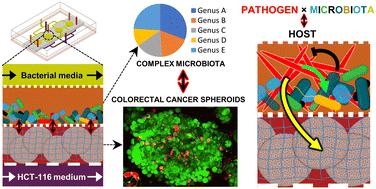Our official English website, www.x-mol.net, welcomes your feedback! (Note: you will need to create a separate account there.)
A microfluidic co-culture model for investigating colonocytes–microbiota interactions in colorectal cancer
Lab on a Chip ( IF 6.1 ) Pub Date : 2024-05-31 , DOI: 10.1039/d4lc00013g Daniel Penarete-Acosta 1 , Rachel Stading 2 , Laura Emerson 1 , Mitchell Horn 2 , Sanjukta Chakraborty 3 , Arum Han 1, 2, 4 , Arul Jayaraman 1, 2
Lab on a Chip ( IF 6.1 ) Pub Date : 2024-05-31 , DOI: 10.1039/d4lc00013g Daniel Penarete-Acosta 1 , Rachel Stading 2 , Laura Emerson 1 , Mitchell Horn 2 , Sanjukta Chakraborty 3 , Arum Han 1, 2, 4 , Arul Jayaraman 1, 2
Affiliation

|
Changes in the abundance of certain bacterial species within the colorectal microbiota correlate with colorectal cancer (CRC) development. While carcinogenic mechanisms of single pathogenic bacteria have been characterized in vitro, limited tools are available to investigate interactions between pathogenic bacteria and both commensal microbiota and colonocytes in a physiologically relevant tumor microenvironment. To address this, we developed a microfluidic device that can be used to co-culture colonocyte spheroids and colorectal microbiota. The device was used to explore the effect of Fusobacterium nucleatum, an opportunistic pathogen associated with colorectal cancer development in humans, on colonocyte gene expression and microbiota composition. F. nucleatum altered the transcription of genes involved in cytokine production, epithelial-to-mesenchymal transition, and proliferation in colonocytes in a contact-independent manner; however, most of these effects were significantly diminished by the presence of commensal microbiota. Interestingly, F. nucleatum significantly altered the abundance of multiple bacterial clades associated with mucosal immune responses and cancer development in the colon. Our results highlight the importance of evaluating the potential carcinogenic activity of pathogens in the context of a commensal microbiota, and the potential to discover novel inter-species microbial interactions in the CRC microenvironment.
中文翻译:

用于研究结直肠癌中结肠细胞-微生物群相互作用的微流体共培养模型
结直肠微生物群中某些细菌种类丰度的变化与结直肠癌(CRC)的发展相关。虽然单一致病菌的致癌机制已在体外得到表征,但可用于研究生理相关肿瘤微环境中致病菌与共生微生物群和结肠细胞之间相互作用的工具有限。为了解决这个问题,我们开发了一种微流体装置,可用于共培养结肠细胞球体和结直肠微生物群。该装置用于探索具核梭杆菌(一种与人类结直肠癌发展相关的机会性病原体)对结肠细胞基因表达和微生物群组成的影响。具核梭菌以不依赖接触的方式改变结肠细胞中参与细胞因子产生、上皮间质转化和增殖的基因转录;然而,这些影响中的大多数都因共生微生物群的存在而显着减弱。有趣的是,具核梭杆菌显着改变了与结肠粘膜免疫反应和癌症发展相关的多个细菌分支的丰度。我们的结果强调了在共生微生物群背景下评估病原体潜在致癌活性的重要性,以及在结直肠癌微环境中发现新的物种间微生物相互作用的潜力。
更新日期:2024-05-31
中文翻译:

用于研究结直肠癌中结肠细胞-微生物群相互作用的微流体共培养模型
结直肠微生物群中某些细菌种类丰度的变化与结直肠癌(CRC)的发展相关。虽然单一致病菌的致癌机制已在体外得到表征,但可用于研究生理相关肿瘤微环境中致病菌与共生微生物群和结肠细胞之间相互作用的工具有限。为了解决这个问题,我们开发了一种微流体装置,可用于共培养结肠细胞球体和结直肠微生物群。该装置用于探索具核梭杆菌(一种与人类结直肠癌发展相关的机会性病原体)对结肠细胞基因表达和微生物群组成的影响。具核梭菌以不依赖接触的方式改变结肠细胞中参与细胞因子产生、上皮间质转化和增殖的基因转录;然而,这些影响中的大多数都因共生微生物群的存在而显着减弱。有趣的是,具核梭杆菌显着改变了与结肠粘膜免疫反应和癌症发展相关的多个细菌分支的丰度。我们的结果强调了在共生微生物群背景下评估病原体潜在致癌活性的重要性,以及在结直肠癌微环境中发现新的物种间微生物相互作用的潜力。












































 京公网安备 11010802027423号
京公网安备 11010802027423号